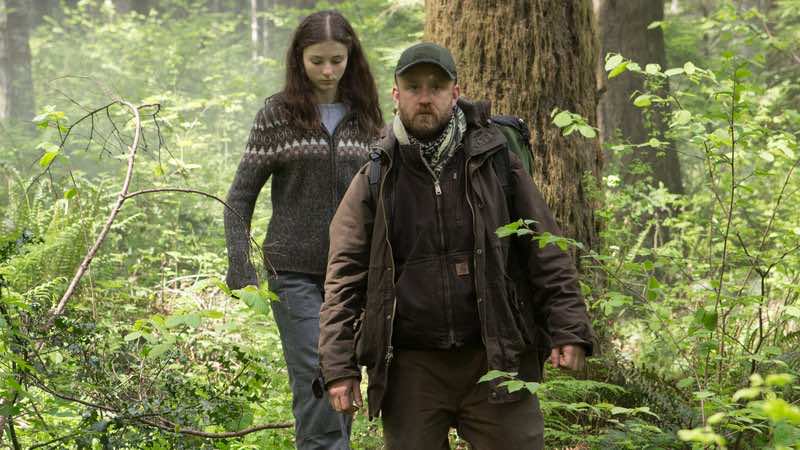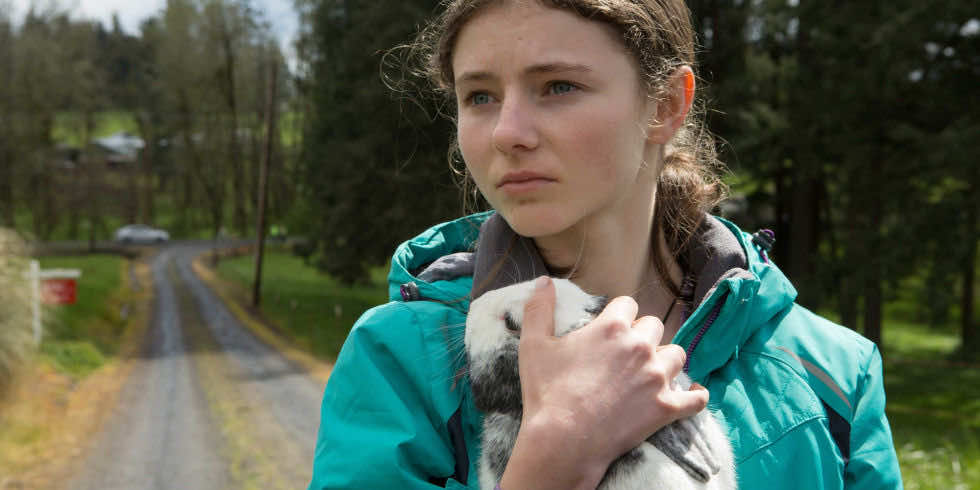
It has been eight years since Winter’s Bone introduced Hollywood to Jennifer Lawrence. Everyone knows how that career has gone. In the meantime, that film’s director, Debra Granik, has only directed a low key documentary called Stray Dog about a Vietnam veteran who played a meth supplier in the 2010 film. Patience has proven worthwhile, as Granick has returned to feature filmmaking a more precise and relaxed director. It was the raw quality of Winter’s Bone that allowed Lawrence to perform as genuinely as she did and get noticed with an Oscar nomination. With Leave No Trace, Granik turns down the angst of her previous feature and raises naturalism to new heights. Though no one can accuse Winter’s Bone as being overly melodramatic, with her new movie Granik balances emotions and a kind of quiet internal pain of the characters for a more sophisticated drama with a light touch of sympathy that will move viewers to their core.
The movie opens in the lush forests of Portland, Oregon. Among the ferns, hemlocks and fir trees, Will (Ben Foster) and his teenage daughter Tom (Thomasin Harcourt McKenzie) build a roaster out of aluminum foil to cook a wild mushroom. Will is a veteran suffering from PTSD, hinted at early in the film’s drama, as he starts awake to the sound of a helicopter. He’s sought the quiet of the woods for peace from the reminders of war in civilization. After spending some time in the woods with this family of two, the sleek modernity of the city arrives in stark contrast after Tom complains of hunger. Besides a grocery store for canned goods and maybe a bit of chocolate, they visit the VA hospital for pills, which Will promptly sells a dude in a homeless encampment at the edge of the forest.

Will’s PTSD never comes up in the woods beyond his nightmares. He doesn’t bring up his past to Tom. There’s only a sense of living day to day off a beautiful landscape. There are, however, drills by Will to test Tom’s ability to hide from the authorities, as they have set up camp on federally protected land. Their blissful yet tense existence alone and disconnection from society doesn’t last long. Despite Dad’s teachings, they’re tracked down by the authorities with canines. They are then briefly but painfully separated, as they undergo interviews by social service workers.
The drama of Leave Not Trace lies not in Will and Tom’s tension with the outside world but in their deep bond. McKenzie’s performance is subtle, as she plays a young woman too long sheltered by her father. She values and sympathizes with his world of pain because it’s all she knows. Their attachment is a co-dependency with little alternatives. Her shelterdness is transmitted in Tom’s soft voice and a feeling of private conflict that only arises as she learns of alternatives in the real world, which includes church, farm life, a teenage boy with a rabbit and a more official community living on the edge of the wilderness. Meanwhile, Foster transmits his own quiet energy. In a short but potent scene after they are placed on a farm by the social workers, Will pets a horse in a stable through the bars. In this brief moment of a seemingly mundane act, Foster transmits a sort of connection to the wild while feeling frustrated by containment. In the next scene, he enters their efficiency and tells Tom, “Pack your things. Don’t take anything you don’t need.”

A couple of years ago, there was a film called Captain Fantastic about a family that was broken after they were found to be living disconnected from society in the woods. The film, starring Viggo Mortensen, is much more sentimental and reaches for pat solutions that seek to assure the audience, yet the far more intangible Leave No Trace feels much more moving. It mostly stems from Granick’s uncontrived filmmaking and work with supporting players performed by non-actors. Sensory film elements are used efficiently. She only ever seems to use the sedate, ambient score by Dickon Hinchliffe (a former member of Tindersticks, who have composed amazing soundtracks for the films of Claire Denis) in the forest scenes, adding a mysticism to nature that makes it seductive. Natural sounds are used for the scenes in civilization, highlighted by everything from the engines of tractor trailers to the broken up scenes during a sermon and quaint dance performed during Will and Tom’s attendance to church. But, Dad notes, it’s only an attempt to fit in.
In Leave No Trace there are no plainly drawn nefarious characters, like the shadowy meth cookers of Winter’s Bone. In fact, Will is treated with the most suspicion by others, above all. Granik, who co-wrote the script with Anne Rosellini and Peter Rock, based on the book My Abandonment by Peter Rock, presents the people Will and Tom encounter as always having good intentions. There is something more intangible that weighs upon everyone’s actions that fuels the film’s tensions, questions mandated by society that stir conflict between people who only desire to care and help. When Tom is told she is living as a homeless person by a social worker, she says of the forest she was found in, “They just don’t understand that it was my home.”
SCREENING UPDATE: Catch Leave No Trace at the Miami Beach Cinematheque for its Spirit of the Independents series now running through January 13, check their calendar for details.
Leave No Trace runs 109 minutes and is rated PG. It opens in our South Florida area in the following counties and theaters:
- MIAMI-DADE: South Beach Regal 18 Miami Beach, AMC Aventura 24, AMC Sunset Place 24, Silverspot Miami at Met Square
- BROWARD: Classic Gateway Theatre
- PALM BEACH COUNTY: AMC Indian River 24, Regal Shadowood 16, Cobb Theatres – Downtown Gardens 16, Cinemark Boynton Beach 14 and XD, Frank Theatres CineBowl & Grille + IMAX at Delray Marketplace
- KEY WEST: Tropic Cinema/Key West
For screenings in other parts of the U.S., visit this link and scroll to the bottom to find a theater near you. Bleeker Street sent us an online screener for the purpose of this review.









